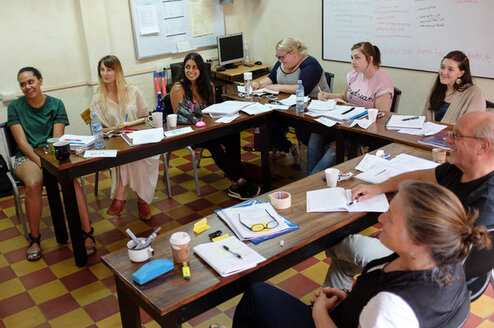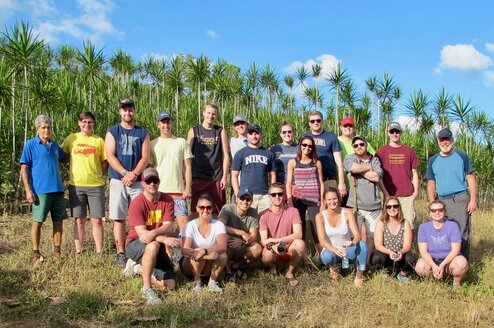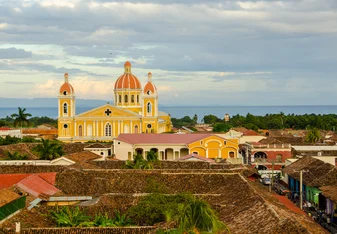TEFL Courses in Central America
TEFL Courses in Central America
Pagination
About
A region with Aztec, Mayan, Spanish, and British influence, Central America is packed with ancient history and home to incredible natural features ranging from active volcanoes to cloud forests and the famous beaches of the beautiful Caribbean Sea. It’s no wonder this region is on the bucket list of most travel junkies.
Endless adventure, natural beauty and biodiversity mixed in with a vibrant history and culture mean that the seven nations of Central America rely heavily on tourism, particularly from the United States, and therefore the demand for English teachers is growing. TEFL courses are available throughout Central America, with the most popular countries for TEFL programs being Panama, Costa Rica, Nicaragua, and Guatemala.
While some TEFL courses in Central America are concentrated in and around cities like Antigua, San José, or Panama City, many opportunities to complete TEFL certification can be found in smaller coastal towns. Whether you prefer to study in a capital city or a relaxed beach town, completing your TEFL certification in Central America can serve as a starting point to a successful career in teaching English as a foreign language around the world.
Course Types
There are three main TEFL course types in Central America: On-site, Hybrid, and Online. For each kind, and in all countries, the qualifications you will need are: be 18+, have a high school or equivalent diploma, and be a native or near-native English speaker.
On-site TEFL Courses
These are courses that you complete entirely in-country and usually in a school with classrooms. Courses may be held over 4 weeks or 120-150 hours and are taught by experienced TEFL teacher-trainers. They can be very intensive but often form the basis for lifelong friendships, contacts with the TEFL teaching community in the region (for leads on good colleagues as well as jobs!), and an immersive kick-start to your new career.
For the best experience, look for a course that is internationally accredited, and offers a small class size, the opportunity to observe experienced teachers, a practical teaching component (where you practice teaching in a real classroom setting) and at least 120 hours of instruction.
Hybrid TEFL Courses
Hybrid TEFL courses can be the best option for people who are unable to take the full 4 weeks/120 hours to complete their certification in-country. They blend on-site and online instruction. Typically you will complete some online modules and self-study and receive some guided tutoring on Skype, and then do a practical teaching component on-site in the country of certification.
Online TEFL Courses
Online TEFL courses are becoming more and more popular for aspiring teachers who are time poor and need the maximum flexibility to complete units of study such as reading and writing assignments. Increasingly, they even allow you to do practice teaching in real classroom settings via platforms like Skype or Google Hangouts! For best results look for an online course that provides this option and make sure you are able to meet with a tutor on Skype on a regular basis.
Planning Your Trip
When & Where to Get Your TEFL
TEFL courses in Central America are typically offered in cities - but not always the capital city! in Nicaragua for example, the majority of courses are in Leon (55 miles from the capital, Managua). You could also consider doing your course in the lakeside city of Granada.
In Guatemala most courses are offered in Antigua, south of the capital. It's got extraordinary colonial heritage and natural features (including volcanoes!)
In Costa Rica, there are many private language institutes in San Jose, the capital; but you can also head out to the coastal towns and have a number of different courses to choose from.
Visas
Guatemala, Honduras and Nicaragua each allow visitors to stay for 90 days without obtaining a tourist visa. For citizens of the US and most other countries there is no visa required for Belize or Panama. For Costa Rica, make sure you have a return ticket to exit. For El Salvador, you will need to purchase a tourist card for around $10.
As for all travel, make sure your passport is valid -- within six months of expiry at a minimum is a good rule of thumb.
Housing & Cost of Living
On the whole you should find that the cost of living is low across the region when compared to the US. Belize, Panama, and Costa Rica will typically be more expensive than other Central American countries (at up to $2000 per month), while El Salvador, Guatemala, and Honduras tend to have an even lower cost of living (more like $1000 per month).
Housing costs will vary depending on your proximity to city centres. In Belize a one-bedroom apartment is around $280 per month in the city centre, or $180 outside the centre. Housing is more expensive in Panama, with a one-bedroom outside the city centre costing around $550 per month. In El Salvador the average price for a one-bedroom city apartment is about $300 per month, with similar housing in Honduras and Guatemala coming in at closer to $200.
Don't hesitate to ask your TEFL course provider for tips on accommodation -- they may even be able to arrange it for you.
Health & Safety
Traces of the Zika virus have been found in Belize. To learn more about Zika and how to avoid getting infected, read the Washington Post's article on Zika precautions.
Hepatitis A, B, and typhoid are typically recommended for Central American countries. Consider a rabies vaccination too, and take malaria tablets to be extra safe in tropical regions
Post-TEFL Tips
Finding a Job
Once you are certified, you can consider getting a job in the country you have studied in, or, look at going further afield. Or, if you want to keep traveling around, you could take a contract, say in Guatemala for six months and then move on and do the same in Nicaragua! Many programs offer job placement assistance, so never hesitate to ask for help from your teachers on that front. They know the industry and may have contacts you can use for leads on jobs.
Hiring times for TEFL jobs vary between countries and institutions - in Nicaragua schools are on a two-month break in December and January so will be hiring for the school year starting in February; in Guatemala non-profits usually offer a six-month contract to foreign teachers and academies or private schools ask for a year’s commitment and January is prime hiring time; in Costa Rica language schools hire year round while the public school year runs from February/March to November; Belize has many private schools with open positions year-round.
Remember that the demand for English is highest in fields like tourism, international business, and education -- so jobs are likely to be concentrated in urban areas and large population centers. The institutions that are likely to have jobs include: language schools/academics, public schools, private schools, international schools and bilingual schools.
You might also consider working as a private English tutor. This gives you the flexibility to design your own classes and material and allows some flexibility around time, too. You will need to manage your budget more intensively as you won’t have a school guaranteeing your paycheck; and you should also make sure your visa allows you to work or do business in the country you are in.
Finally, if you’re in a position to volunteer your time, look around for volunteer teaching positions too. Central America contains many developing economies and there is a high need across the region for education, especially in English, many who cannot afford to pay for classes, and many non-profit organizations looking for volunteers.
What to Expect
In Belize, there may be other teaching opportunities, because it is an English-speaking country. If you are able to teach other subjects (i.e. math, geography, science) there may be roles in schools for that kind of teaching too.
Salaries generally cover your basic living expenses. In Costa Rica for example the monthly salary is $1,000 USD, which is about twice that received by most Costa Ricans.
Some teaching jobs include subsidized housing and some schools will help you find somewhere to live - again, always worth asking.
Some parts of Central America may have stricter education cultures that you are used to - find out all you can about the norms (e.g. expectations around how you dress, how students and teachers address each other, how colleagues at school address each other,whether there is a uniform, or daily school prayer) before you start.

















